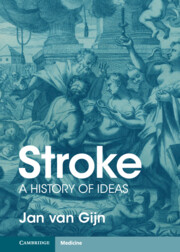Book contents
- Stroke
- Stroke
- Copyright page
- Epigraph
- Dedication
- Contents
- Preface
- One The Ventricles
- Two The Force of Blood
- Three Congestion
- Four Forgotten Forms of Apoplexy
- Five Haemorrhage
- Six Ramollissement
- Seven Thrombosis and Embolism
- Eight No Man’s Land: The Neck Arteries
- Nine Lacunes
- Ten Stroke Warnings
- Eleven Saccular Aneurysms
- Twelve Cerebral Venous Thrombosis
- Epilogue
- Acknowledgements
- References
- Index
Three - Congestion
Apoplexy in the ‘Long Eighteenth Century’
Published online by Cambridge University Press: 06 July 2023
- Stroke
- Stroke
- Copyright page
- Epigraph
- Dedication
- Contents
- Preface
- One The Ventricles
- Two The Force of Blood
- Three Congestion
- Four Forgotten Forms of Apoplexy
- Five Haemorrhage
- Six Ramollissement
- Seven Thrombosis and Embolism
- Eight No Man’s Land: The Neck Arteries
- Nine Lacunes
- Ten Stroke Warnings
- Eleven Saccular Aneurysms
- Twelve Cerebral Venous Thrombosis
- Epilogue
- Acknowledgements
- References
- Index
Summary
In the eighteenth century, most diseases were still ill-defined and explained by local or remote causes. The diagnosis of ‘apoplexy’ was applied in a broad sense, with unresponsiveness as the cardinal symptom and overfilling of the skull or its vessels as the key event. Its purported causes included not only primary changes in or around the brain (Boerhaave), but also the general constitution and external circumstances. Thus, two doctrines of attributing causality more or less coexisted in the ‘long eighteenth century’, up to the 1820s. One was the morphological approach, practised in Vienna (de Haen) and Bologna (Valsalva), and especially in Padua (Morgagni distinguished three kinds of apoplexy: haemorrhagic, serous, and ‘other’). The other doctrine, related to Galen’s ‘fluidism’ and only slowly losing ground, implicated mainly external factors as the cause of fullness in the head (Portal).
Information
- Type
- Chapter
- Information
- StrokeA History of Ideas, pp. 83 - 112Publisher: Cambridge University PressPrint publication year: 2023
